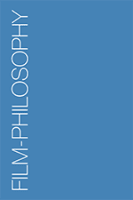
Film-Philosophy
Scope & Guideline
Fostering Multidisciplinary Dialogues in Film and Thought
Introduction
Aims and Scopes
- Philosophical Analysis of Film:
The journal focuses on examining films through various philosophical lenses, including existentialism, phenomenology, and ethics, to enrich understanding of cinematic texts and their implications. - Interdisciplinary Approaches:
It embraces an interdisciplinary methodology, drawing on insights from fields such as cultural studies, aesthetics, and critical theory, to explore the complexities of film as a cultural artifact. - Cinematic Aesthetics and Ethics:
There is a consistent emphasis on the aesthetics of film and the ethical dimensions of cinematic representation, particularly in relation to contemporary social issues and historical contexts. - Exploration of Film Theory and Criticism:
The journal contributes to film theory by engaging with both classical and contemporary philosophical thought, offering critiques and new perspectives on established theories. - Engagement with Diverse Cinematic Forms:
It encompasses a wide range of cinematic forms, including mainstream, avant-garde, and documentary films, thus fostering a comprehensive discourse on varied cinematic experiences.
Trending and Emerging
- Posthumanism and Nonhuman Perspectives:
There is a growing interest in posthumanism and nonhuman perspectives in cinema, emphasizing how films address themes related to ecology, animal studies, and the implications of technology on human existence. - Feminist Film Theory and Materiality:
Feminist approaches to film, particularly those that examine materiality and embodiment, are increasingly prominent, reflecting a broader cultural movement towards gender studies and intersectionality within cinematic discourse. - Neoliberalism and Cultural Critique:
Recent publications are focusing on critiques of neoliberalism as depicted in film, exploring how cinema can disrupt dominant discourses and reflect societal anxieties regarding economic systems. - Aesthetics of Slow Cinema:
The aesthetics of slow cinema and its philosophical implications have emerged as a significant theme, allowing for deeper explorations of time, perception, and viewer engagement with film. - Philosophical Engagement with New Media:
There is a notable trend towards engaging with new media and digital cinema, exploring how these forms challenge traditional philosophical and aesthetic frameworks in film studies.
Declining or Waning
- Traditional Film Genres:
Discussions centered on conventional film genres, such as classic Hollywood narratives, have become less prominent, suggesting a move towards more avant-garde and experimental cinema. - Historical Film Analysis:
There seems to be a decline in the focus on historical film analysis, particularly films that strictly adhere to historical accuracy or traditional storytelling, as the journal shifts to more contemporary and abstract interpretations. - Reductionist Philosophical Frameworks:
The use of reductionist or overly simplistic philosophical frameworks to analyze films appears to be waning, indicating a preference for more nuanced and complex philosophical discussions that engage with multiple perspectives.
Similar Journals

TIJDSCHRIFT VOOR FILOSOFIE
Elevating Contemporary Philosophical DebatesTIJDSCHRIFT VOOR FILOSOFIE is a distinguished academic journal published by Peeters, dedicated to advancing critical discourse in the field of philosophy. Established in Belgium, this journal has been a platform for rigorous intellectual exploration since its inception. Recognized in 2023 within the Q4 category in Philosophy and ranked #721 out of 806 in Scopus’ Arts and Humanities division, it serves as a forum for researchers, professionals, and students to engage with contemporary philosophical debates and issues. Though not an Open Access journal, it provides a comprehensive collection of articles that contribute to the understanding and evolution of philosophical thought. With a commitment to scholarly excellence, TIJDSCHRIFT VOOR FILOSOFIE continues to foster a vibrant academic community, encouraging contributions that challenge, inform, and refine philosophical inquiries.
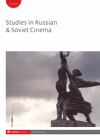
Studies in Russian and Soviet Cinema
Celebrating the Intersection of Film, Culture, and HistoryStudies in Russian and Soviet Cinema, published by Routledge Journals, Taylor & Francis Ltd, provides a critical forum for the exploration and analysis of cinematic practices, histories, and cultures from the Russian and Soviet eras. With its ISSN 1750-3132 and E-ISSN 1750-3140, this journal operates under the editorial guidance of leading scholars in the field, making significant contributions to the Visual Arts and Performing Arts and Communication categories, where it is ranked in the upper quartiles of its peer group. The journal spans a rich period of study, converging insights from 2006 to 2024, thereby allowing for an in-depth understanding of the evolution and impact of cinema in societal narratives. Researchers and enthusiasts alike will appreciate its dedication to illuminating the often-neglected cinematic treasures of Russia and the Soviet Union, promoting scholarly discourse through its rigorous analyses and diverse range of articles. This journal serves as an essential resource for anyone interested in the intersections of film, culture, and history.

CINEASTE
Unveiling the Rich Tapestry of Cinematic DiscourseCINEASTE is a distinguished journal dedicated to the critical exploration of cinema, providing a platform for scholars, filmmakers, and enthusiasts to engage with the complexities of film studies. Established and published by CINEASTE, this periodical serves as a vital resource for those interested in the intersection of visual arts and performing arts. Although it is not currently offered as Open Access, CINEASTE remains a respected publication within the academic community, having been indexed in Scopus until 2016. With an ISSN of 0009-7004, it has established itself despite its lower ranking in the arts and humanities category, reflecting the competitive nature of this field. Researchers, students, and professionals alike will find ample opportunities for insightful discussion and scholarly contributions to the evolving landscape of cinematic discourse. CINEASTE continues to uphold its mission of enhancing film scholarship, making it a crucial reference point for anyone eager to deepen their understanding of cinema's artistic and cultural significance.

REVUE PHILOSOPHIQUE DE LA FRANCE ET DE L ETRANGER
Engaging Minds with Timeless Philosophical QuestionsREVUE PHILOSOPHIQUE DE LA FRANCE ET DE L'ETRANGER is a distinguished academic journal published by PRESSES UNIV FRANCE, focusing primarily on the field of philosophy. Established in 1949 and continuing its legacy into 2023, this journal serves as a vital platform for scholarly dialogue and exploration of philosophical ideas that transcend national boundaries. While it currently holds a Q4 ranking in the philosophy category according to the latest Scopus assessments, its contributions remain significant in fostering a comprehensive understanding of various philosophical discourses. Based in France, at 6 AVENUE REILLE, 75685 PARIS CEDEX 14, this journal provides an essential resource for researchers, professionals, and students alike, despite not being an open-access publication. Each issue encourages a deeper engagement with contemporary philosophical thought while contributing to the academic community's ongoing discussions on fundamental philosophical questions.

Topicos-Revista de Filosofia
Advancing Scholarly Conversations in Contemporary PhilosophyTopicos-Revista de Filosofia, published by UNIV PANAMERICANA, DEPT FILOSOFIA, stands as a significant academic platform within the field of philosophy, actively contributing to scholarly discourse since 2006 through its open access model. With an ISSN of 0188-6649 and an E-ISSN of 2007-8498, this journal is dedicated to fostering critical thought and philosophical inquiry in both regional and global contexts. Operating out of Mexico City, it provides a vital avenue for researchers, professionals, and students to engage with contemporary philosophical issues, reflected in its ranking of Q3 in the 2023 category for Philosophy and its position within the 33rd percentile among over 800 peer journals in the field according to Scopus. Topicos not only prioritizes accessibility to philosophical scholarship but also aims to propel academic discussions and elevate the standards of philosophical research. With coverage extending from 2013 to 2024, it invites contributions that bridge diverse philosophical traditions and innovative thought pathways, reinforcing its role as an influential resource for the philosophical community.
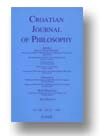
Croatian Journal of Philosophy
A Nexus for Innovative Philosophical ExplorationCroatian Journal of Philosophy is a distinguished academic platform dedicated to the advancement of philosophical discourse, published by KRUZAK D O O. With an ISSN of 1333-1108 and an E-ISSN of 1847-6139, this journal has been a key player in the field since its inception in 2008, continuing to progress through its converged years until 2024. Recognized for its scholarly contributions, it holds a prestigious placement in Q3 within the philosophy category for 2023 and ranks #571 out of 806 in Scopus, reflecting its engagement with a broad spectrum of scholarly discussions and ideas. Though it operates without an Open Access model, the journal remains a vital resource for researchers, professionals, and students who are keen to explore contemporary and traditional philosophical issues from diverse perspectives. The journal's commitment to expanding the boundaries of philosophical inquiry emphasizes the significance of interdisciplinary dialogue, making it a reputable choice for those seeking to deepen their understanding of philosophical thought.

Journal of Japanese Philosophy
Advancing Understanding of Traditional and Contemporary PhilosophiesThe Journal of Japanese Philosophy, published by SUNY Press, serves as a pivotal platform for scholars and practitioners interested in the rich tapestry of Japanese philosophical thought. With its ISSN 2327-0195 and E-ISSN 2327-0209, this journal invites rigorous scrutiny and creative engagement with both traditional and contemporary philosophies emerging from Japan. While the journal does not currently offer Open Access options, it remains accessible through major academic libraries and databases. By fostering interdisciplinary dialogue, the Journal of Japanese Philosophy aims to illuminate various aspects such as aesthetics, ethics, politics, and environmental philosophy, contributing significantly to the broader field of philosophy. As a respected source of scholarship, it plays a critical role in shaping the understanding of Japanese philosophy within global contexts, making it an essential resource for researchers, professionals, and students alike.

Hrvatski Filmski Ljetopis
Illuminating the Art of Filmmaking.Hrvatski Filmski Ljetopis, published by the Croatian Film Clubs Association, serves as a pivotal academic journal in the field of film studies, celebrating and analyzing the rich cinematic heritage of Croatia and beyond. With an ISSN of 1330-7665, this journal caters to researchers, practitioners, and students who are passionate about the art of filmmaking, encompassing both theoretical discourse and practical implications. Although it is not currently available as an open-access publication, its curated content is of significant value to anyone interested in the evolution, critique, and history of film in a Croatian context, having previously been indexed in Scopus until coverage was discontinued. The journal operates out of Zagreb, Croatia, at the Croatian Film Clubs Association headquarters, and aims to foster scholarly dialogue while contributing to the broader field of national and international cinematography.
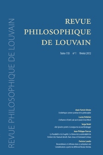
REVUE PHILOSOPHIQUE DE LOUVAIN
Fostering Rigorous Dialogue in PhilosophyREVUE PHILOSOPHIQUE DE LOUVAIN is a distinguished academic journal dedicated to the exploration of philosophical discourse and thought, published by PEETERS in Belgium. With an ISSN of 0035-3841 and E-ISSN 1783-1768, this journal has been a significant contributor to the field of philosophy since its inception in 1973. Although it has been classified in Q4 in the 2023 Philosophy category with a Scopus rank of 488 out of 762, the journal has established a reputation for fostering rigorous dialogue and covering a diverse array of philosophical topics through comprehensive articles and critical essays. Despite a temporary discontinuation in Scopus coverage from 2019 to 2021, REVUE PHILOSOPHIQUE DE LOUVAIN remains a significant platform for scholars, professionals, and students looking to engage deeply with contemporary philosophical issues. The journal's commitment to philosophical inquiry is complemented by its accessible publication model, although it does not currently offer open access options. For those based in or visiting Leuven, Belgium, the journal's office is located at BONDGENOTENLAAN 153, B-3000 LEUVEN, BELGIUM, a hub of intellectual engagement in the heart of Europe.
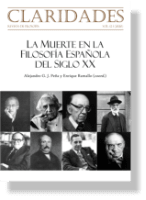
Claridades-Revista de Filosofia
Exploring the Depths of Philosophical ThoughtClaridades-Revista de Filosofia is a distinguished open-access journal dedicated to the exploration of philosophical thought and discourse, published by the ASOC PROMOCION FILOSOFIA & CULTURA MALAGA-FICUM. Since its inception in 2009, the journal has been committed to providing a platform for innovative philosophical research and insights, fostering engagement within the academic community and beyond. Based in the culturally rich city of Malaga, Spain, the journal caters to the diverse landscape of philosophical inquiry, with a focus on nurturing academic exchange globally. Although the journal currently holds a Q4 ranking in Philosophy according to Scopus, it aims to elevate its impact and contribute significantly to contemporary philosophical debates. Researchers, professionals, and students alike will find a wealth of thought-provoking articles and discussions that not only enrich their understanding of the discipline but also encourage critical dialogue about the pressing philosophical issues of our time. With its dedicated mission and open access model, Claridades is poised to be an essential resource for anyone invested in the vibrant and evolving field of philosophy.